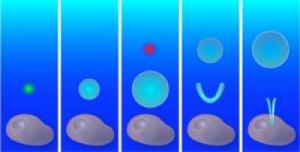Aug 10 2010
Duke University physicists have developed a way to produce sharp fluid jets with enough precision that they can inject material into a single, living cell.
The technique promises a way to deliver drugs to cells one at a time, which is likely to be very valuable for research involving stem cells and other cellular-level studies. The research appears in the current issue of the APS journal Physical Review Letters.
 The timed expansion and collapse of two bubbles creates a liquid jet that can penetrate a fine hole in the membrane of a cell. From left to right: A laser (green circle) focused inside a water bath locally vaporizes the liquid, creating an expanding bubble (light blue). Just after the first bubble reaches its maximum size, a second laser (red circle) generates another bubble.
The timed expansion and collapse of two bubbles creates a liquid jet that can penetrate a fine hole in the membrane of a cell. From left to right: A laser (green circle) focused inside a water bath locally vaporizes the liquid, creating an expanding bubble (light blue). Just after the first bubble reaches its maximum size, a second laser (red circle) generates another bubble.
The physicists produced the jets by focusing lasers into a fluid surrounding a target cell. The lasers heated molecules of a blue dye dissolved in the fluid, which in turn created tiny bubbles to rapidly grow and collapse. When these sorts of bubbles are produced individually, they create shock waves that spread throughout the liquid. But producing two adjacent bubbles in rapid succession results in small, powerful jets capable of poking tiny holes, measuring only 0.2 millionths of a meter across, in cell membranes.
The researchers confirmed that the jets allowed the introduction of fluids into the cell by checking for signs of the blue dye inside the pierced cells. The dye is toxic, and it killed the pierced cells, but the holes the jets produced were small enough that it's likely that the jets will offer a way to inject live cells with nontoxic substances without significantly damaging them.
Source: http://www.aps.org/